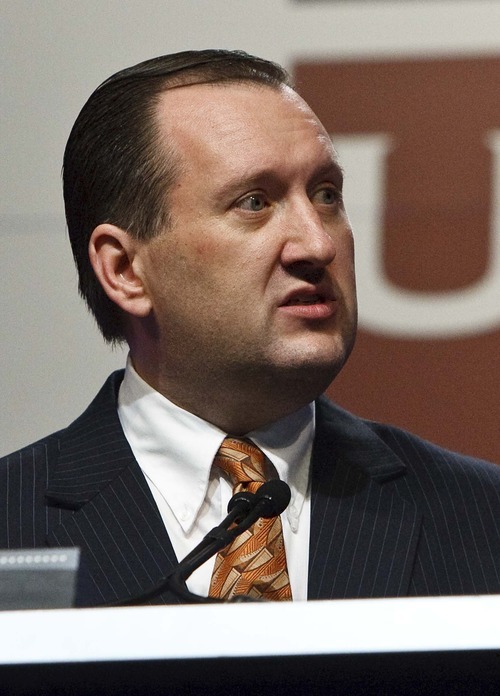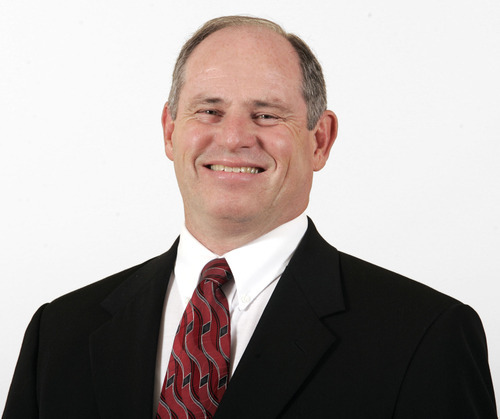This is an archived article that was published on sltrib.com in 2012, and information in the article may be outdated. It is provided only for personal research purposes and may not be reprinted.
State auditor election campaigns usually are sleepy affairs between, well, boring auditors. But this year the Republican candidates are playing hardball in their primary race.
Challenger John Dougall, a legislator and high-tech consultant who is not an auditor, says 17-year-incumbent auditor Auston Johnson "has been missing in action for the past decade," allowing misdeeds to go undiscovered or uncorrected for too long. He also accuses Johnson of scheduling the release of his audit reports for political gain.
Johnson fires back that Dougall doesn't understand what his office must do by law, and that he is unqualified to oversee it. He finds it ironic that Dougall says a top goal is to increase government transparency, but the Highland lawmaker sponsored the infamous HB477, which would have gutted the state's open-records law if not for huge public protests that led lawmakers to rescind it.
"The [Utah] constitution says that the state auditor is the financial auditor of public accounts," Johnson says. "In order to do financial audits, I think you ought to be a [certified public accountant]. I am the only CPA in the race. … You have to be a CPA to sign an audit report."
That training, he adds, comes in handy.
"There's not a week that goes by that I don't settle disputes of a technical nature between auditors," Johnson explains. " … To me, it's the same thing as having a non-attorney in the Attorney General's Office. The head of surgery ought to be a surgeon. The head of nursing ought to be a nurse. The head of an organization needs to be as qualified as the people whose work he is directing."
Dougall sees the auditor's job in larger terms.
"I don't think our problem is too few CPAs in the office. What we have is insufficient leadership and understanding what the office is," he says. "The job of the state auditor is not to be the accountant in chief. It is to be the constitutional watchdog for the taxpayers. What that means is setting a vision for the office and hiring the necessary talent."
For example, Dougall says, Johnson has not performed needed audits into Medicaid fraud. He also says his Republican rival needs to do more performance, not just financial, audits.
Johnson counters that other auditing agencies are responsible for work that Dougall claims he is ignoring. For instance, he says, the Medicaid inspector general probes for fraud with a staff that includes doctors and nurses trained to look for billing and care problems. He says the legislative auditor general is in charge of state performance audits.
"It's like a team approach. If you don't play your position, you leave a hole open," Johnson says. "If you move over and take somebody else's job, you duplicate the effort and waste resources."
Dougall disagrees. He says the legislative auditor general by law can do only those performance audits that are requested by legislators and approved by their leaders.
"The state auditor is an independent constitutional office," Dougall says. "It does not have to get permission from someone else to perform audits" — and should do more performance audits.
Dougall also complains that Johnson's office found violations of procurement rules at the Department of Alcoholic Beverage Control for years, "and all they did was write memos. … When you have a serious violation like that, you have to engage policymakers."
Johnson says he did that. "Those problems were caught, and they were reported to the Legislature. But, at that time, there was not a lot of political will to take out the director" of DABC.
Johnson says Dougall's record as author of HB477 is an issue because the state auditor appoints a member of the State Records Committee, which decides cases when state agencies balk at releasing requested records. HB477 would have unraveled much of the open-records law and was rushed to passage.
Dougall says the HB477 debate led to a review of open-records measures and later passage of SB177 to tweak them, which all sides praised. "So if he wants to take issue with someone who is willing to raise an issue that needs to be debated and discussed that ultimately brings about legislation that people praise, OK."
Dougall says he has done other things that contribute to government transparency, including pushing laws for electronic notice of public meetings and financial-transparency websites.
"I'm not sure that anyone in the Legislature has focused more on transparency than I have," Dougall says.
Finally, Dougall complains that Johnson has released several audits just before the election to gain headlines.
"It's suspect," Dougall says. "Some of my colleagues have said they have seen more out of that office in the last month than in the last decade."
Johnson says this year's releases are similar in number and schedule to other years, which voters can check on his website. A Salt Lake Tribune review of that data shows that between 2007 and 2011, his office released an average of 44 audits of all types by mid-June. This year, it had released fewer: 35.
The winner of the June 26 GOP primary will face Democrat Mark Sage, who also is neither a CPA nor an auditor, and Constitution Party candidate Richard Proctor.
"If you look nationwide," Dougall says, "there are many state auditors who are not CPAs."
The fall matchup
The winner of the June 26 primary between Republicans John Dougall and Auston Johnson will face Democrat Mark Sage and Constitution Party candidate Richard Proctor in November.





